
Recorded conversations and interviews on electronics design and manufacturing with the editors of PCD&F/Circuits Assembly, brought to you by the Printed Circuit Engineering Association (PCEA)
Recorded conversations and interviews on electronics design and manufacturing with the editors of PCD&F/Circuits Assembly, brought to you by the Printed Circuit Engineering Association (PCEA)
Episodes
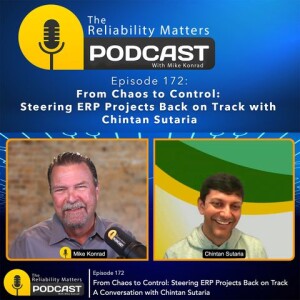
Thursday Jul 10, 2025
RM 172: Steering ERP Projects Back on Track with Chintan Sutaria
Thursday Jul 10, 2025
Thursday Jul 10, 2025
Today we're diving into a topic that keeps many executives awake at night—ERP implementations. More specifically, why so many of them fail and, perhaps more importantly, how to fix them midstream before they derail your operations.
Joining Mike Konrad is someone who knows this space inside and out—Chintan Sutaria. Sutaria grew up working in an EMS business from a young age, gaining firsthand experience in the unique challenges of our industry. His career path took him into the world of business process consulting at some of the largest Big 5 firms, and he has since worked with numerous EMS companies on a wide range of projects.
Many may recognize Sutaria as the founder and former CEO of CalcuQuote, a well-known supply chain management software company for the EMS industry. Recently, he founded, OpenJar, a consultancy dedicated to helping electronics manufacturers navigate complex business challenges—including ERP implementations.
We’ll discuss his new company as well as his recent blog post, "Why Your ERP Implementation Failed (and How to Fix It Midstream)", explore common pitfalls, and uncover strategies to steer your ERP project back on course.
Chapters:
00:00:00 Common Failures in ERP Implementations and How to Fix Them
00:02:20 Transitioning from Calcot to Open Jar
00:04:07 Embracing Innovative Ideas with Open Jar Philosophy
00:07:47 Why Your ERP Implementation Failed and How to Fix It
00:08:06 The Challenges of SAP and ERP Implementations
00:10:00 The Importance of Second Opinions in ERP Implementations
00:12:05 Common Misconceptions in ERP Implementation
00:13:57 Navigating the Learning Curve in New Systems
00:15:53 Key Criteria for Successful Project Implementation
00:17:42 Identifying Unique Strengths in EMS Companies
00:19:39 Challenges in Change Management for EMS Software
00:21:47 Early Warning Signs of a Failing ERP System
00:23:34 Navigating ERP Implementation Challenges
00:25:40 Keeping Cool Under Pressure: A Guide to Effective Problem Solving
00:27:32 Importance of ERP Functionality Prioritization
00:29:33 Navigating ERP Implementation Changes
00:31:56 Balancing Efficiency with Employee Discomfort in ERP Systems
00:33:22 Importance of Structured Approach in Consulting
00:35:29 Challenges in Software Implementation
00:37:40 The Challenges of Implementing Systems in Small Businesses
00:39:47 Challenges of Scaling a Business with Automation
00:41:55 Essential Strategies for Successful ERP Implementation
00:43:55 Insights with Serial Entrepreneur Chintan Sataria
00:45:56 Podcast Updates and Listener Engagement

Tuesday Jul 08, 2025
Cofactr on Supply Chain Execution
Tuesday Jul 08, 2025
Tuesday Jul 08, 2025
Cofactr is a supply chain execution platform that includes source-to-pay and 3PL solutions for electronics hardware developers.
Live from the show floor at PCB East in May, cofounder Phil Gulley and VP of marketing Libby Melton join Matt Leary, Geoffrey Hazelett and Mike Buetow to discuss the company's procurement process tools and software integrations.
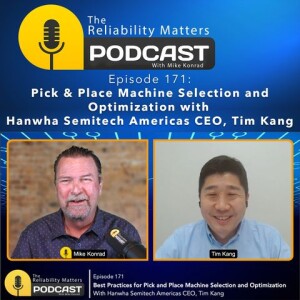
Thursday Jun 26, 2025
RM 171: Pick & Place Machine Selection and Optimization
Thursday Jun 26, 2025
Thursday Jun 26, 2025
Today we're turning our attention to a cornerstone of modern electronics manufacturing: pick-and-place technology.
Joining Mike Konrad is Tim Kang, CEO of Hanwha Semitech Americas. With nearly two decades of experience in the electronics manufacturing space — starting as a mechanical engineer and now leading one of the top pick and place equipment providers — Kang brings a wealth of insight into what it takes to build reliable assemblies.
In this episode, we’re covering best practices for selecting the most appropriate pick and place machine, how to get the most out of your equipment, and the common mistakes that can compromise productivity and long-term reliability.
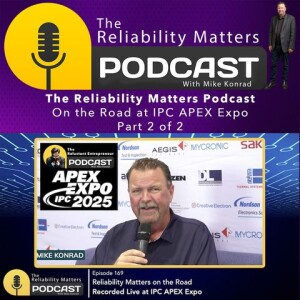
Thursday Jun 26, 2025
RM 169: On the Road - Soldering
Thursday Jun 26, 2025
Thursday Jun 26, 2025
On this episode of the Reliability Matters podcast, Mike Konrad left his usual studio for the IPC Apex Expo trade show.
He interviews two subject matter experts on topics related to electronics assembly.
The guests are:
- Gerald Gardner, global product manager at Weller, a manufacturer of hand soldering equipment fume extraction systems, and precision tools.
- Mike Young – CEO OF SASinno Americas, a manufacturer of wave and selective soldering equipment.
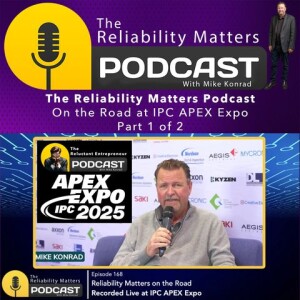
Thursday Jun 26, 2025
RM 168: On the Road - Electronics Assembly
Thursday Jun 26, 2025
Thursday Jun 26, 2025
Mike Konrad interviews three subject matter experts on various topics related to electronics assembly.
The guests are:
- Greg Beck, director of sales at Absolute EMS, a contract manufacturer.
- Brian Watson, cofounder of HyRel Technologies, a global provider of quickturn semiconductor modification solutions.
- Keith Sweatman, technical advisor at Nihon Superior, a manufacturer of soldering materials

Friday Jun 13, 2025
Chris Banton of EMA Design Automation on Board Optimization
Friday Jun 13, 2025
Friday Jun 13, 2025
Chris Banton of EMA Design Automation joins Matt Leary, Geoffrey Hazelett and Mike Buetow to talk about how the EDA vendor's helps printed circuit board designers optimize their designs.
Recorded live on the show floor at PCB East 2025.

Wednesday May 28, 2025
PCB Chat 143: Frank Mullaney and Emma Hudson of iNEMI
Wednesday May 28, 2025
Wednesday May 28, 2025
For early 30 years, the International Electronics Manufacturing Initiative (INEMI), has been the go-to consortium for many leading OEMs companies and their suppliers to identify and develop next-generation technology, and then help deploy it for high-volume manufacturing.
Frank Mullaney, director of roadmapping, and Emma Hudson, new project manager, discuss some of the consortium’s ongoing projects, including new content on PCB test methods, solders, and laminates.
Mullaney has a Ph.D. in electronic engineering from University College Dublin, and spent 20 years in managerial and technical roles for Bell Labs, where he worked on a range of wireless and networking technologies, and established Bell Labs’ Internet of Things research program. He is also cochair of the Complex Integrated Systems section of the INEMI Roadmap.
Hudson previously was distinguished member of technical staff at from Underwriter’s Labs, and has a bachelor’s in materials engineering from Coventry University, and worked in the automotive electronics sector in three continents.

Monday May 26, 2025
Tom Britton and Nataliia Matsiuk on an AI Solution for PCB Manufacturing
Monday May 26, 2025
Monday May 26, 2025
Tom Britton and Nataliia Matsiuk join Geoffrey Hazelett of FreedomCAD, Matt Leary of Newgrange Design and Mike Buetow of PCEA to share work on a Department of Energy program that pair scientists with real-world industry problems.
In particular, Britton and Matsiuk are focused on developing an AI solution for the PCB manufacturing industry. Among the topics discussed are roadblocks US companies face to develop a smart factory in which AI systems communicate with equipment, and how the public solution could involve an open AI model partnership.
Recorded live on the show floor at PCB East 2025.

Monday May 26, 2025
Robert Byrne of Allspice
Monday May 26, 2025
Monday May 26, 2025
Robert Bryne, director of marketing at Allspice.io, joins Geoffrey Hazelett of FreedomCAD, Matt Leary of Newgrange Design and Mike Buetow of PCEA to talk about the five-year-old company's GIT hardware platform that helps hardware and electrical engineers streamline hardware design reviews.
We discuss the ECAD formats that Allspice engages with, the templates used, why GitHub matters for software teams, and the company's target markets.
Recorded live on the show floor at PCB East 2025.
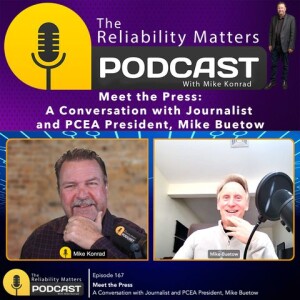
Friday Apr 25, 2025
RM 167: Meet the Press: A Conversation with PCEA President Mike Buetow
Friday Apr 25, 2025
Friday Apr 25, 2025
Today, we’re diving deep into the world of electronics manufacturing from a unique vantage point—that of the press.
Mike Konrad's guest is someone who has spent decades at the forefront of reporting on the electronics manufacturing industry. Mike Buetow, president of the Printed Circuit Engineering Association (PCEA), has covered everything from the latest technological advancements to the biggest challenges facing manufacturers today.
If there’s a major trend shaping the industry, you can bet Mike has written about it, analyzed it, and spoken with the experts behind it.
In this episode, we’ll explore the evolving landscape of electronics manufacturing, from supply chain disruptions and AI-driven automation to the future of ultra-high-density interconnects and the real impact of reshoring efforts.
We’ll also get an inside look at what it takes to cover this ever-changing industry—how stories are chosen, what topics are making waves, and what challenges lie ahead.
00:00:00 Insights from Electronics Manufacturing Journalism
00:03:45 The Role of Printed Circuit Engineering Association (PCEA)
00:05:00 Acquisition by PCA and Leadership Changes
00:07:17 Enhancing Careers in Circuit Board Design and Engineering
00:09:36 Collaboration in Electronics Design and Assembly
00:11:47 Unique Challenges in Board Fabrication and Design
00:14:58 The Challenges of Consistency in CM (Contract Manufacturing)
00:16:17 Diverse Strategies in Electronics Manufacturing
00:18:41 The Future of Complex Component Design
00:21:08 Understanding Moore's Law and Its Implications
00:23:39 The Impact of Tariffs on Manufacturing and Consumer Costs
00:26:09 Challenges in Relocating Manufacturing Operations
00:28:26 Challenges in Building State-of-the-Art Semiconductor Fabs
00:30:47 Supply Chain Challenges and Resiliency
00:33:15 Supply Chain Vulnerabilities in Military Manufacturing
00:35:48 Impact of Trade Wars on Manufacturing Industries
00:38:12 The Role of AI in Data Analysis and Assembly
00:40:40 The Evolution of Memory Chips and Data Collection
00:43:25 AI in Pattern Recognition Across Industries
00:45:55 The Concept of Engineer Residuals: A New Incentive in Technology Adoption
00:48:33 Advice for Young Professionals in a Rapidly Evolving Industry
00:50:54 The Role of Naivety in Revolution and Evolution
00:53:15 Networking Opportunities at PCB Trade Shows
